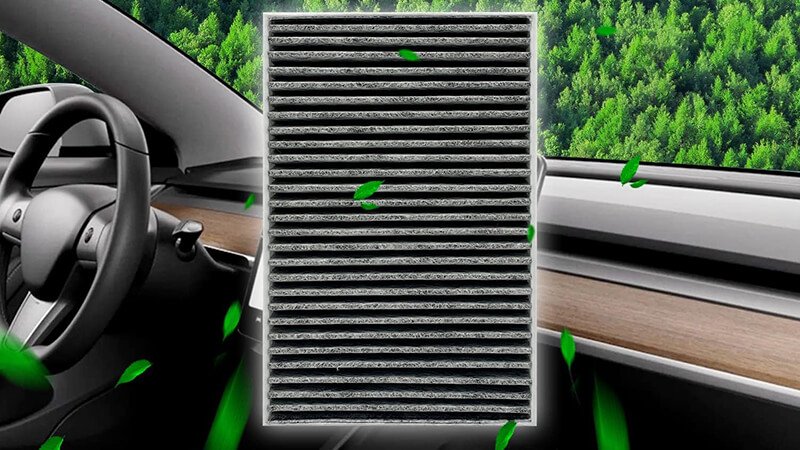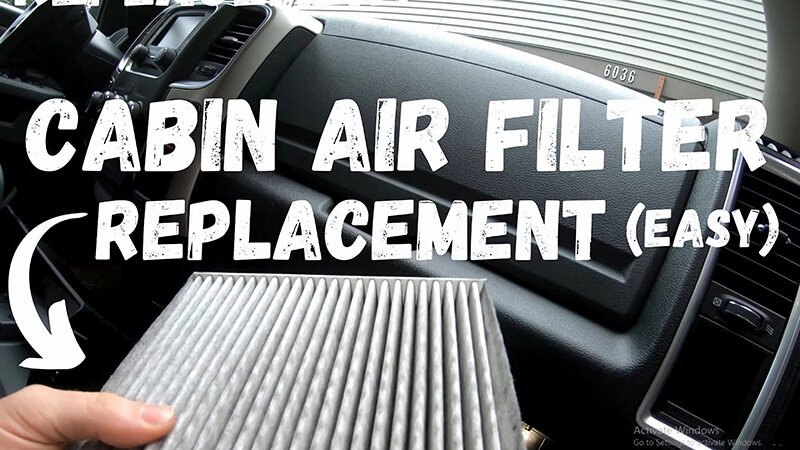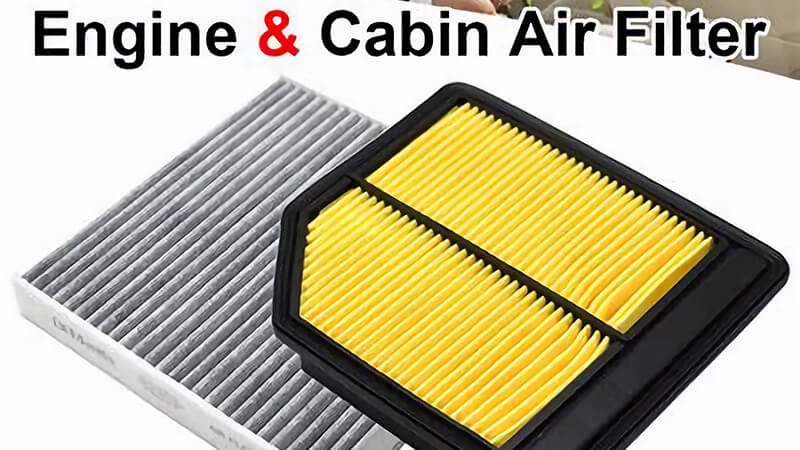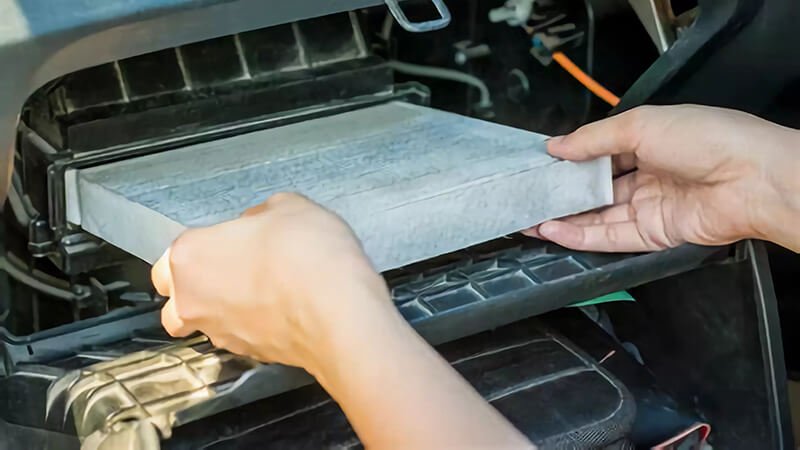Many car owners worry that something as simple as a wet cabin air filter could ruin their engine. While it’s understandable to be concerned, the cabin air filter's role is not directly related to the engine. In this article, we'll discuss how a wet cabin air filter affects your vehicle, the HVAC system, and whether it poses any risk to your engine.
A wet cabin air filter does not directly harm the engine. Its role is to filter the air entering the passenger cabin, not the air that fuels the engine. Although it can affect the HVAC system’s efficiency, it does not impact the engine’s performance or cause engine damage.
Now that we’ve established that a wet cabin air filter doesn’t damage the engine, let’s dive deeper into understanding the impact of a wet cabin air filter on your vehicle's HVAC system and why it’s important to maintain it properly.

What Happens if My Cabin Air Filter is Wet?
You might be wondering, if a cabin air filter is wet, what happens to your vehicle? While this may not lead to engine failure, it can affect your car’s HVAC system. Here’s what you need to know about the consequences of a wet cabin air filter.
When a cabin air filter gets wet, it can restrict airflow, reduce the efficiency of your HVAC system, and cause unpleasant odors. However, it won't directly harm the engine, as it only filters the air entering the cabin, not the engine’s intake.
A wet cabin air filter doesn’t pose any direct risk to the engine, but it can cause several problems in your vehicle’s HVAC system. Let’s break down what happens when your cabin air filter becomes wet and how it can affect the comfort and air quality inside your vehicle.
Key Issues Caused by a Wet Cabin Air Filter:
-
- When a cabin air filter gets wet, it can become clogged and lose its ability to filter air effectively. This leads to restricted airflow through the HVAC system, causing less efficient heating or cooling. The system may struggle to reach the desired temperature, or the airflow may become weak, reducing the comfort inside the vehicle.
Table: Effects of Wet Cabin Air Filter on Airflow
Condition Resulting Issue Wet Cabin Air Filter Reduced airflow, less efficient HVAC Dried Cabin Air Filter Optimal airflow, efficient HVAC -
- Wet cabin air filters can trap moisture, which can lead to the growth of mold and mildew. These organisms thrive in damp environments and can create musty, unpleasant smells when the HVAC system circulates air through the filter. This can significantly affect the air quality inside the vehicle, making the driving experience uncomfortable for passengers.
Table: Causes of Odors from Wet Filters
Cause Resulting Odor Mold/Mildew Growth in Filter Musty, damp, or moldy odors inside cabin Unchanged Wet Filter Prolonged bad smells in HVAC system -
Increased Wear on HVAC Components3:
- If a wet cabin air filter is left in place, it can force the HVAC system to work harder. The blower fan, for instance, has to compensate for the reduced airflow, which can increase wear on this component. Over time, this additional strain can lead to premature failure of the fan and other HVAC components, resulting in costly repairs.
Table: Impact of Wet Filter on HVAC Components
Component Effect of Wet Cabin Air Filter HVAC Blower Fan Increased wear, potential failure Air Conditioning System Reduced efficiency, potential damage Heater Core Overheated, inefficient operation -
Reduced Filtration Efficiency:
- A wet filter can also reduce the efficiency of the filtration process. Moisture can cause the filter material to swell or become compromised, allowing dust, debris, and allergens to pass through. This defeats the purpose of the filter, which is designed to ensure that clean air enters the cabin.
Table: Effect of Moisture on Filter Efficiency
Condition Effect on Filter Efficiency Wet Cabin Air Filter Decreased filtration, higher pollutant levels in cabin air Dry and Clean Cabin Air Filter Optimal filtration, better air quality inside cabin
In conclusion, while a wet cabin air filter doesn’t affect engine performance, it can have a significant impact on your HVAC system. Regular maintenance and timely filter replacements are essential to keep your vehicle's air system functioning properly.

Can a Cabin Air Filter Affect an Engine?
Although the cabin air filter does not directly affect engine performance, many people still wonder whether there’s any indirect impact. Let’s take a closer look at whether a cabin air filter can play a role in the engine’s overall performance and health.
The cabin air filter is not involved in the engine’s air intake, so it does not directly affect engine performance. Its job is solely to filter the air entering the cabin, ensuring a clean environment for passengers.
The engine air filter and cabin air filter are two separate systems, with distinct roles in the vehicle. Understanding these roles is crucial to appreciating why the cabin air filter doesn’t affect engine performance.
Key Differences Between the Cabin Air Filter4 and Engine Air Filter:
-
Purpose:
- Engine Air Filter: Filters the air entering the engine for combustion. Clean air is essential for proper engine performance and fuel efficiency.
- Cabin Air Filter: Filters the air entering the passenger cabin, ensuring clean air for passengers and preventing dust, pollen, and pollutants from entering the cabin.
-
Location:
- Engine Air Filter: Located within the engine bay, directly connected to the engine’s air intake system.
- Cabin Air Filter: Located inside the vehicle, typically behind the glove compartment or under the dashboard, part of the HVAC system.
-
Impact on Performance:
- Engine Air Filter: Directly impacts engine performance. A clogged or dirty engine air filter can restrict airflow, leading to reduced engine power, poor fuel efficiency, and increased emissions.
- Cabin Air Filter: Does not affect engine performance. It’s solely responsible for the air quality inside the cabin.
-
Maintenance:
- Engine Air Filter: Needs regular maintenance to ensure the engine runs optimally. A dirty or clogged engine air filter can cause significant damage to the engine over time.
- Cabin Air Filter: Requires less frequent maintenance but should still be replaced regularly to maintain air quality and HVAC efficiency.
Table: Key Differences Between Air Filters
| Feature | Engine Air Filter5 | Cabin Air Filter |
|---|---|---|
| Purpose | Filters air entering the engine | Filters air entering the cabin |
| Location | In the engine bay | Inside the vehicle, part of HVAC |
| Effect on Performance | Direct impact on engine efficiency | No impact on engine performance |
| Maintenance Frequency | Regular maintenance is required | Should be replaced periodically |
In summary, while the cabin air filter plays a vital role in passenger comfort, it has no direct impact on the engine’s performance. The engine air filter, on the other hand, is essential for ensuring your engine runs smoothly.

What Happens if Your Air Intake Gets Wet?
While a wet cabin air filter doesn’t affect the engine, you might be concerned about what happens if the air intake itself gets wet. Water in the air intake could be much more problematic for your engine. Let’s explore the potential dangers of water entering the engine’s air intake.
Water in the engine’s air intake can cause severe damage, potentially leading to hydrolock, which occurs when water enters the engine’s cylinders. This can result in catastrophic engine failure and expensive repairs.
Water entering the engine’s air intake is a serious issue that could lead to catastrophic engine failure. The engine relies on a steady supply of clean, dry air to maintain proper combustion. When water is introduced into the intake system, it can cause immediate and severe damage.
Risks of Water in the Engine’s Air Intake:
-
Hydrolock:
- Hydrolock6 is a condition that occurs when water enters the engine’s cylinders, preventing the pistons from moving. Since water cannot be compressed like air, this can cause severe damage to the engine components, including bent rods, cracked cylinders, and total engine failure.
Table: Hydrolock Damage
Component Potential Damage Pistons Bent, cracked, or damaged due to water pressure Connecting Rods Bending or breaking, causing irreversible engine damage Cylinders Cracking or warping, leading to permanent failure -
- If water consistently enters the intake system, it can cause corrosion in the engine components, particularly in the intake manifold, valves, and other metal parts. This corrosion can shorten the lifespan of the engine and lead to expensive repairs.
-
- Even small amounts of water can affect engine performance. Water in the intake can cause the engine to misfire, leading to loss of power, poor acceleration, and rough idling.
In short, water in the engine’s air intake is something that should be avoided at all costs. Always ensure the air intake is protected from water and keep your vehicle away from deep water hazards.

Does Water Damage an Air Filter?
Water can potentially damage an air filter, but the level of damage depends on the type of filter. While water won’t necessarily ruin an air filter instantly, it can affect its performance over time. Let’s explore how water interacts with air filters and what you should do if your filter gets wet.
Water can damage an air filter, especially if it’s not dried or replaced in a timely manner. If the air filter gets wet, it may reduce airflow and efficiency, leading to engine performance issues. Wet filters should be dried or replaced to prevent any long-term problems.
Water can damage both cabin air filters and engine air filters, but the effects differ. While a wet cabin air filter mainly affects the HVAC system, a wet engine air filter can impact the engine’s performance. If the filter material is soaked, it may lose its ability to trap particles, reducing filtration efficiency.
Effects of Water on Air Filters:
-
Reduced Efficiency: When an air filter gets wet, its ability to trap debris and particles is compromised. This can lead to reduced filtration efficiency, which can result in dirt and contaminants entering the engine or cabin.
Table: Reduced Efficiency9 from Wet Filters
Type of Filter Impact of Wetness Engine Air Filter Increased dirt and contaminants entering engine Cabin Air Filter Poor air quality, allergens passing into cabin -
Clogging10: A wet air filter may become clogged more quickly than a dry one, as moisture attracts dust and dirt. This can reduce airflow, causing the HVAC system to work harder or affecting engine performance.
-
Mold and Mildew Growth11: Moisture in the filter can lead to the growth of mold or mildew, especially in cabin air filters. This can cause unpleasant odors and reduce air quality.
In conclusion, while water does not instantly ruin an air filter, it can degrade its performance over time. It’s important to dry or replace any wet filters to avoid long-term issues.

Conclusion
In conclusion, while a wet cabin air filter12 does not directly damage a healthy engine, it can affect the efficiency of your HVAC system, causing issues like poor airflow and unpleasant odors. Regular maintenance and timely replacement of filters, both cabin and engine types, are essential to keeping your vehicle running smoothly and ensuring both comfort and performance.
-
Understanding restricted airflow can help you maintain optimal HVAC performance and comfort in your vehicle. ↩
-
Learn effective methods to remove odors and improve air quality in your vehicle's cabin. ↩
-
Discover how to prevent wear and extend the life of your vehicle's HVAC system with proper maintenance. ↩
-
Explore this link to understand how the Cabin Air Filter enhances passenger comfort and air quality in your vehicle. ↩
-
Learn about the critical role of the Engine Air Filter in maintaining engine efficiency and performance. ↩
-
Understanding hydrolock is crucial for preventing severe engine damage. Explore this link to learn more about its causes and effects. ↩
-
Corrosion can significantly impact engine longevity. Discover how water contributes to this issue and ways to prevent it. ↩
-
Loss of power can affect vehicle performance. Learn about the impact of water in the intake system and how to mitigate it. ↩
-
Understanding reduced efficiency in air filters can help you maintain optimal performance and air quality in your vehicle. ↩
-
Learning about clogging in air filters can help you take proactive measures to ensure efficient airflow and performance. ↩
-
Exploring the impact of mold and mildew on air filters can guide you in preventing air quality issues in your car. ↩
-
Find your best products and OEM cabin air filter, clicking this link to get your best price. ↩













